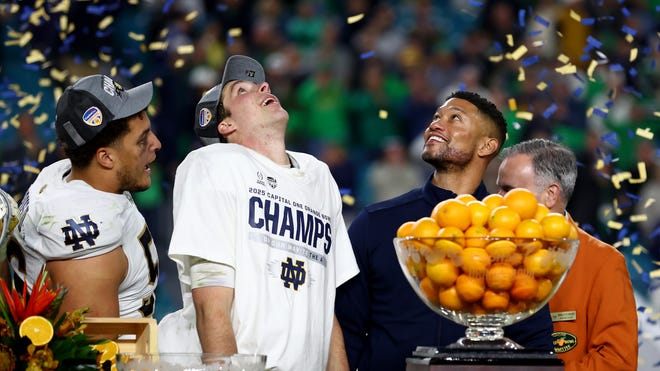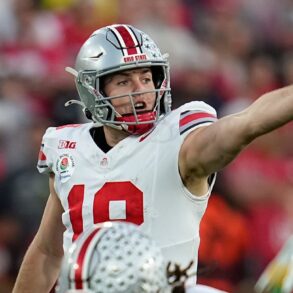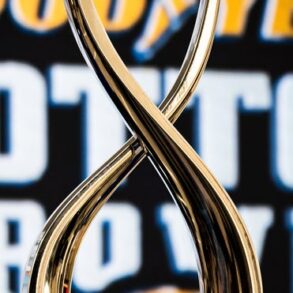Sports fans are all eyes on the College Football Playoff semifinal games as bowl season and the inaugural year of the 12-team playoff system head toward the championship game on Jan. 20. There has been much to marvel at, from remarkable touchdown passes to the pageantry of marching bands.
But I’ve found my attention drawn to something else: In an era of high-profile diversity debacles in higher education, college athletics is a model of excellence in diversity work.
Diversity work has two dimensions: achievement for historically marginalized groups, and cooperation across differences. Both are on impressive display in college football.
We take diversity wins in college sports for granted
With respect to achievement, consider that the past five winners of the Heisman Trophy, given to the best player in college football, have all been Black students.
This year’s winner, the University of Colorado’s Travis Hunter, was the rare two-way player, coached to excellence on both offense and defense by a Black football coach, Deion Sanders.
After being appointed head coach at Colorado in December 2022, Sanders brought many of his players from Jackson State (one of the historically Black colleges and universities) with him to Boulder, including the aforementioned Hunter. He then proceeded to execute one of the most impressive turnarounds in college football, leading the formerly 1-11 Buffaloes to a bowl game this year.
It just so happens that the team that Colorado played in the Alamo Bowl, Brigham Young University, also had one of the nation’s best diversity stories. BYU was founded and is supported by The Church of Jesus Christ of Latter-day Saints, but the quarterback of their football team, Jake Retzlaff, is Jewish.
At a time of heightened antisemitism, Retzlaff spoke of how the Mormon university not only welcomed his faith but also helped him strengthen it ‒ and made interfaith bridgebuilding a priority for the whole team.
In an era of rising prejudice and ugly polarization, it is an inspiring illustration of how college athletics excels at facilitating cooperation across differences.
Opinion:Would you call Olympic gold medalists Simone Biles or Suni Lee a ‘DEI hire’?
The remarkable thing about these diversity achievements in college athletics is that we take them entirely for granted. Nobody is surprised when minority student-athletes perform well on the field, or when Jewish quarterbacks throw touchdown passes to Mormon wide receivers.
I think we should be shouting the pluralism achievements of college athletics from the mountaintops and learning from the model, especially considering the disastrous headlines about diversity work in other quarters of higher education.
Diversity wins in college sports vs. DEI losses in higher education

For example, while the University of Michigan’s first Black head football coach, Sherrone Moore, was winning big games against Ohio State and University of Alabama, The New York Times Magazine reported in October that the university has spent about a quarter of a billion dollars since 2016 on a diversity, equity and inclusion program that seemed to increase racial tensions rather than promoting minority achievement or facilitating cooperation.
I think the fundamental contrast between the diversity model of college athletics and the anti-oppression paradigm that prevails in other quarters of higher education can be summed up in this illustration:
Sports prides itself on preparing athletes of all identities to work together to make game-winning plays against ferocious defenses in front of hostile crowds.
Leaders of the anti-oppression paradigm are convinced that minorities are so fragile, they cannot even face a speaker of a different identity and viewpoint in a comfortable lecture hall.
Opinion:America is a potluck, not a battlefield where we defeat our fellow citizens
Anybody who believes that higher education should be about nurturing people’s strengths, not convincing them of their weakness, ought to take an interest in how college athletics goes about its work.
That’s why I found the Peacock series “Here Come the Irish” so revealing (disclaimer: I am a huge Notre Dame fan!). The show gives a fascinating behind-the-scenes look at how Notre Dame’s Black head football coach, Marcus Freeman, prepares his student-athletes for both achievement and cooperation.
Two things struck me as I watched the episodes.
The first is just how academic a lot of athletics is. The myriad references to “studying the body of work of the opposing team,” being “dedicated to improving technique” and “working on your decision-making” made it clear to me that excellence in athletics is just as much about mental acuity as it is about physical prowess.
The second thing that struck me was the consistent message that Freeman delivered: Committing to preparation, personal responsibility and team glory over individual glory leads to perfection.

The anti-oppression model of diversity work takes the opposite approach. While coach Freeman repeats the mantra of seeking perfection to his multiracial team, Kenneth Jones and Tema Okun, in their widely read paper “White Supremacy Culture,” state that perfectionism is a tool of white oppression.
The athletic theory of diversity work is to focus on everything you can do to excel as a student-athlete and contribute as teammate. The anti-oppression theory is to go looking for anything that might stand in your way ‒ and to resist anybody who even remotely represents those things.
This sets up perverse incentives. In sports, your theory is proved right when players excel and the team wins games. In anti-oppression approaches to diversity work, your theory is proved right when minorities fail and when people are divided.
Diversity work should be a top priority for higher education. Thankfully, there is a department on most campuses that is an example of excellence – the athletic department.
As we enjoy the end of another great season of college football, we should be learning from what sports gets right about diversity work, and finding ways to spread those lessons to the rest of the campus.
Eboo Patel is founder and president of Interfaith America, an organization that works with colleges on diversity.
This post was originally published on this site be sure to check out more of their content.








